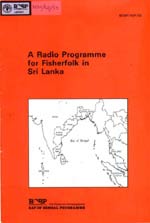
REPORTS - BOBP/REP/53
A Radio Programme for Fisherfolk in Sri Lanka
byR.N. Roy
Senior Extension Adviser BOBP
 |
REPORTS - BOBP/REP/53 A Radio Programme for Fisherfolk in Sri LankabyR.N. Roy Senior Extension Adviser BOBP |
|
Executing Agency: FOOD AND AGRICULTURE ORGANIZATION OF THE UNITED NATIONS Funding Agency: UNITED NATIONS DEVELOPMENT PROGRAMME BAY OF BENGAL PROGRAMME; Madras, India 1992 |
| The designations employed and the presentation of material in this publication do not imply the expression of any opinion whatsoever on the part of the Food and Agriculture Organization of the United Nations concerning the legal status of any country, territory, city or area or of its authorities, or concerning the delimitation of its frontiers or boundaries. |
All rights reserved. Reproduction and dissemination of material in this information product for educational or other non-commercial purposes are authorized without any prior written permission from the copyright holders provided the source is fully acknowledged. Reproduction of material in this information product for resale or other commercial purposes is prohibited without written permission of the copyright holders. Applications for such permission should be addressed to the Chief, Publishing and Multimedia Service, Information Division, FAO, Viale delle Terme di Caracalla, 00100 Rome, Italy or by email to [email protected]
© FAO 2004
|
This report describes the process, achievements and learnings of a subproject which set out to introduce a radio programme as a communication and extension tool to help Sri Lankan fisherfolk in their development. The subproject was initiated in January 1988, the radio programme went on the air with daily and weekly programmes in January I989 and has continued since without a break. In March 1992, the subproject was terminated and the responsibility for the programme was assumed by the Ministry of Fisheries and Aquatic Resources (MFAR) of the Government of Sri Lanka. MFAR was responsible for the execution of the project. The Sri Lanka Broadcasting Corporation worked closely with MFAR and provided expertise, training inputs and the services of a senior broadcaster to act as the Team Leader. The Bay of Bengal Programme (BOBP) provided technical assistance, support for training, broadcast, production, equipment and monitoring. The Norwegian Agency for International Development (NORAD), through their office in Sri Lanka, provided a generous grant to cover some of the training and expertise inputs. World Radio for Environment and Natural Resources (WREN), a media organization in the UK, was contracted to provide the subproject the services of Michael Pickstock who provided the bulk of the training inputs, advice on management, programme design and equipment, and who undertook the evaluation of the activity. |
1. GENESIS
1.1 Note on how fisherfolk radio could help
1.2 Project acceptance
2. THE IMPLEMENTATION PROCESS
2.1 Audience profile and needs assessment
2.2 Programme strategy
2.3 Staff selection
2.4 Training
2.5 The Fisherfolk Radio Programme Steering Committee
2.6 Equipment and studio
2.7 Going on the air
2.8 Audience response and feedback
2.9 Evaluation
2.10 Regional workshop on ‘Fisherfolk Radio’
2.11 Sustainability beyond BOBP
3. LEARNINGS
4. RECOMMENDATIONS
4.1 Management of the Fisherfolk Radio Programme
4.2 Location of the RPU
4.3 The Fisherfolk Radio Programme Steering Committee
4.4 RPU staff support
4.5 RPU staff training and development
4.6 Administrative issues
4.7 Coordination with the broadcasting organization
APPENDICES
I. Project chronology
II. Documentation related to subproject
PUBLICATIONS OF THE BAY OF BENGAL PROGRAMME